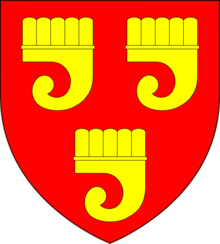Bevil Granville
Sir Bevil Granville (died 1706) was an English soldier who served as Governor of Pendennis Castle in Cornwall and as Governor of Barbados.

Origins
Granville was the eldest son of Bernard Granville (1631–1701) (4th son of Sir Bevil Grenville (1596–1643) who died in heroic circumstances at the Battle of Lansdowne), Master of the Horse and a Gentleman of the Bedchamber to King Charles II (1660–1685) and MP for Launceston, Saltash, Lostwithiel and Plymouth,[1] by his wife Anne Morley, daughter and sole heiress of Cuthbert Morley of Hornby, Yorkshire.[2] His uncle was John Granville, 1st Earl of Bath (1628–1701), of Stowe, Kilkhampton in Cornwall, who played a prominent role in the Restoration of the Monarchy of 1660. His family was descended from Sir Richard I de Grenville (d. post 1142) (alias de Grainvilla, de Greinvill, etc.), one of the Twelve Knights of Glamorgan, of Neath Castle, Glamorgan and of Bideford, Devon and Stowe, Kilkhampton in Cornwall. In 1661[3] the family changed the spelling of its surname from Grenville to Granville, to emphasise its supposed origins at Granville, Normandy.
Career
After keeping his terms at Trinity College, Cambridge, he was awarded Master of Arts in 1679.[4][5] He then obtained a commission in the regiment of foot nominally commanded by his uncle, John Granville, 1st Earl of Bath (1628–1701). He received the honour of knighthood from King James II (1685–1688). He was engaged in military action in the Low Countries. In December 1693 he came over from Flanders, waited on King William III, of whom he seems to have been a favourite, and gave him an account of the state of that country.[6]
In January 1694 he was gazetted to the colonelcy of the regiment of the Earl of Bath, on the latter's resignation,[7] and joined it in Flanders. In June 1695, he fought a duel with Henri Nompar de Caumont, Marquis de Rade, a French Huguenot exile and Colonel of 6th Foot, later the Royal Warwickshire Regiment; de Rade died of wounds shortly afterwards.[8] On 21 March 1695–6 he was appointed by the king Governor of Pendennis Castle in Cornwall.[9] At the end of May he re-embarked for Flanders, where again he got into trouble, "being accused by several officers for illegal practices on his regiment". A court-martial, however, acquitted him.[10] In June 1698 his regiment was ordered to Ireland .[11] In May 1702 Granville accepted the governorship of Barbados, with a salary of £2,000 per annum, but did not sail for the colony until March 1703.[12] He had scarcely settled when he fell dangerously ill of a fever which had spread across the island.[13] Some of the planters complained to the privy council of his tyranny and extortion. After a full hearing on 20 July 1705, Grenville was "honourably acquitted", but it was deemed politic to recall him in the following year of 1706.[14] He died at sea on his passage home in September or October 1706.[15]
Death and succession
He died at sea on his passage home from Barbados in September or October 1706.[16] He was unmarried. By his will, dated 16 January 1701-2, and proved at London on 6 November 1706,[17] he left his estate to his brother, George Granville, later created Baron Lansdowne.
References
- Vivian, Lt.Col. J.L., (Ed.) The Visitations of Cornwall: Comprising the Heralds' Visitations of 1530, 1573 & 1620; with additions by J.L. Vivian, Exeter, 1887, p.192
- Burke, John, Genealogical and Heraldic History of the Commoners of Great Britain and Ireland, Vol.3, 1836, pp. 3–7, Granville of Calwich Abbey
- Round, J. Horace, Family Origins and Other Studies, London, 1930, The Granvilles and the Monks, pp. 130–169, p. 130 (1661, the time of the elevation of John Grenville to the Earldom of Bath)
- Cantabr. Graduati 1787, p. 167
- "Grenville, Bevill (GRNL677B)". A Cambridge Alumni Database. University of Cambridge.
- Narcissus Luttrell, Brief Historical Relation of State Affairs, iii. 240
- Luttrell, iii. 254
- Onnekirk, David (author), Glozier, Mathew (ed) (2017). War, Religion and Service: Huguenot Soldiering, 1685–1713. Routledge. p. 34. ISBN 978-1138275751.CS1 maint: extra text: authors list (link)
- Luttrell, iv. 33
- Luttrell, iv. 227, 254.
- Luttrell, iv. 392.
- Luttrell, v. 175, 198, 278.
- Luttrell, v. 351
- Luttrell, v. 575, vi. 92.
- Luttrell, vi. 105.
- Luttrell, vi. 105.
- P.C.C.234, Eedes
| Military offices | ||
|---|---|---|
| Preceded by The Earl of Bath |
Colonel of Granville's Regiment of Foot 1693–1703 |
Succeeded by The Lord North and Grey |
| Governor of Pendennis Castle 1696–1703 |
Succeeded by George Granville | |
![]()